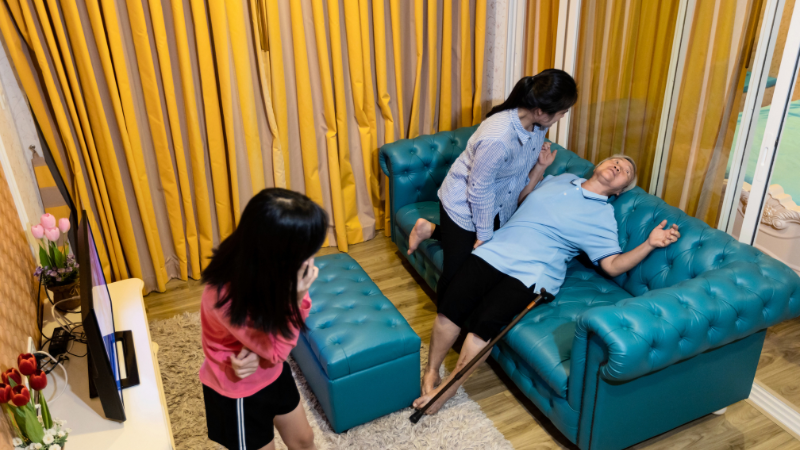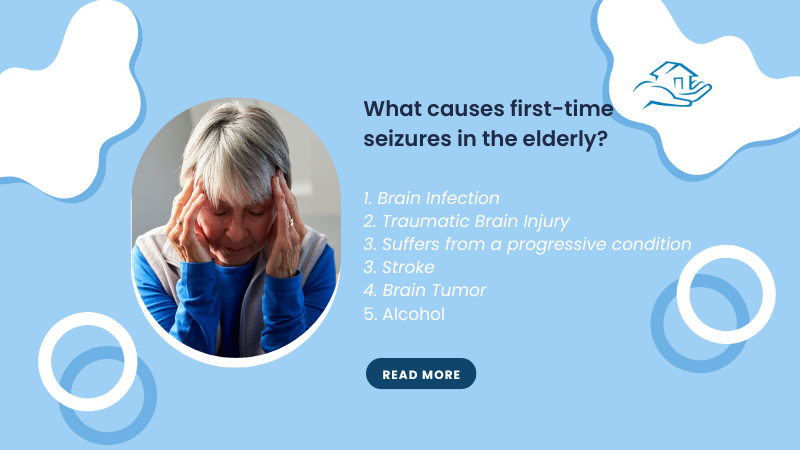

Seizures in the elderly are known as geriatric epilepsy. It’s a common condition of the nervous system in older people. Late-onset epilepsy decreases the quality of life of affected seniors. Uncovering the causes of first-time seizures in aging adults can help protect their well-being.
What is a seizure?
A seizure occurs when the brain produces an uncontrollable burst of electrical activity. The affected aging individual experiences changes to their physical movements, behavior, feelings, and level of consciousness. The seizure causes a range of symptoms, from mild to severe.
What are the symptoms of a seizure?
When an older adult has a seizure, their arms and legs produce uncontrolled jerking movements. They may experience a staring spell or temporary confusion. Seizures can cause a loss of consciousness or awareness. Cognitive changes include fear, anxiety, or a feeling of déjà vu.
How long do seizures last?
The majority of seizures last anywhere from 30 seconds to two minutes. If a seizure extends beyond five minutes, it’s a medical emergency. When two or more seizures occur without a known cause and within a span of 24 hours, it is known as epilepsy.
What causes first-time seizures in the elderly?
When older people experience a seizure for the first time, it’s usually due to a specific health condition or a traumatic injury. Various causes trigger different types of seizures. Some causes are low blood sugar, brain infection, and epilepsy.
1. Brain Infection
The central nervous system can become infected by bacteria, parasites, or viruses. When these pathogens infect the brain tissue, the aging body produces an inflammatory or immune response that alters how the brain’s electrical activity functions. A seizure can result.
Infections that can lead to late-onset seizures in elderly people include central nervous system tuberculosis, meningitis, cerebral malaria, viral meningoencephalitis, and neurocysticercosis. Other infections that can contribute to seizures in older adults are river blindness (onchocerciasis), brain abscess, and cerebral toxoplasmosis.
2. Traumatic Brain Injury
Seniors may experience a first-time seizure when they suffer a traumatic brain injury (TBI). The seizure may occur immediately after the TBI or happen hours, days or weeks later. About half of all seizures related to a TBI occur within 24 hours after the injury.
The risk factors for having a first-time seizure after a TBI include age; being older than 65 increases the risk. If the injury penetrates the skull, a seizure is likely. A contusion (bruise to the brain) and brain bleeding also increase the risk of having a TBI-related seizure.
3. Stroke
A stroke is a common cerebrovascular disease among seniors. It occurs when a blood vessel in the brain bursts or becomes obstructed. The brain consequently experiences injury, as blood flow to the brain is interrupted. This injury changes the brain’s electrical activity, causing a post-stroke seizure.
The timing of the first-time seizure varies. In some cases, the seizure occurs within 24 hours after the stroke event. In other instances, a senior can experience a seizure months after the stroke. When the stroke is severe, it is more likely to lead to a seizure.
4. Brain Tumor
When an aging adult has a seizure for the first time, it may be an indication of a brain tumor. If the senior continues to seizure or the seizure worsens, it could suggest that the tumor has increased in size or caused bleeding or swelling in the brain tissue.
Brain tumors vary in type, but ones that are known to trigger seizures in the elderly include neuroglioma, astrocytoma, ganglioglioma, meningioma, and oligodendroglioma. These variations in tumors cause seizures in different ways, such as leading to pressure or bleeding in the brain.
5. Alcohol
Certain lifestyle factors also trigger first-time seizures in the elderly. Drinking an excessive amount of alcohol within a short span of time can lead to alcohol poisoning. An alcohol overdose alters the older person’s electrolyte and fluid levels, causing the seizure.
Drinking heavily for extended periods suppresses the aging adult’s central nervous system. Abruptly cutting back on the alcohol intake or stopping it entirely, otherwise known as alcohol withdrawal, impacts the older person’s nervous system and can trigger a first-time seizure.
Advancing age is a peak time for developing first-time seizures. The elderly may experience complications after having a seizure—and these can be dangerous for them or others. For example, an older adult who seizes may fall and break a bone or injure themselves.
Since seizures cause a loss of awareness or the loss of ability to control a vehicle while conscious, older drivers who have a seizure put themselves and other drivers at risk for a car accident. Seniors who have a seizure while bathing are in danger of accidentally drowning.
It’s important for seniors who have a first-time seizure to consult a doctor for medical advice. The professional caregivers at Assisting Hands Home Care are available to provide safe transportation and escort to the physician’s office. If the doctor prescribes medicine, we provide medication reminders.
Our senior home care services are vital to the health and well-being of aging people. We assist the elderly with the activities of daily living. Caregiver support and supervision help older adults maintain their independent lifestyle and give them an opportunity to comfortably age in place.
Typical caregiver responsibilities include healthy meal preparation and grocery shopping. In addition to transportation to medical facilities, we drive seniors to events, like family gatherings. Our transportation services are a safe alternative for seniors who are prone to having seizures.
We’re also pleasant companions who engage socially with elderly care recipients through light conversations, outings to local destinations, puzzles, games, and recreational activities they enjoy. Our dependable elder care services keep aging adults socially active and prevent loneliness and isolation.
The non-medical senior home care services from Assisting Hands Home Care are invaluable to families and their aging loved ones in Westlake, Ohio, and the surrounding communities. If the senior in your life has seizures, promote their safety with quality home care from us. Schedule an in-home consultation at 440-517-4623 today.



